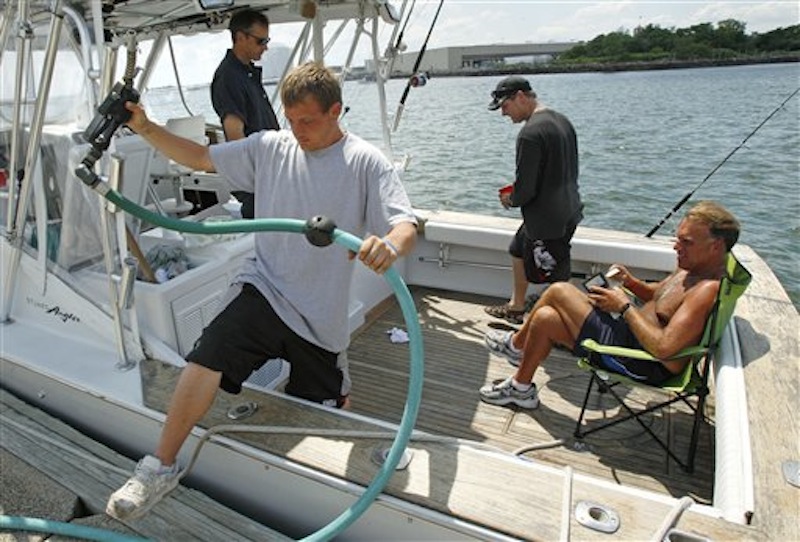BOSTON — They’ve been cruising the region’s chilly waters for centuries and today number in the hundreds of thousands, but much remains unknown about the Northeast’s recreational boaters.
Now, a major survey aims to find out more about them, including where they go, how they get there and how much they spend along the way.
The idea is to ensure that this large and sometimes overlooked constituency gets proper consideration for its range, local importance and economic impact as ocean development forges ahead. Offshore wind turbines, liquefied natural gas terminals and aquaculture pens are a few of the projects discussed for the areas off the busy coastline.
“If they’re going to be encroaching in areas where there is a lot of recreational activity, I don’t think it’s good for anyone,” said boater Rob Harris, a lawyer from Salem, N.H.
About 68,000 boaters were invited by mail to participate in the online survey, which begins this month and runs through October. State and U.S. Coast Guard records indicate about 374,000 boats total are registered in the six states the survey covers — the five New England coastal states and New York.
SeaPlan, a nonprofit ocean research group, is conducting the survey in partnership with the Northeast Regional Ocean Council, state coastal planners and researchers at the University of Massachusetts.
The effort traces back to President Barack Obama’s National Ocean Policy, which aims to create a balanced approach to using the country’s ocean resources. Planners in the Northeast soon discovered the recreational boating data was sparse, despite a local culture in which packed marinas and highways filled with boats on trailers are part of the scenery between Memorial Day and Labor Day.
The lack of data simply reflects the freedom boating offers, which is central to its appeal but makes it tough to truly measure its impact because people just do their own thing, said Grant Westerson, head of the Connecticut Marine Trades Association in Essex, Conn.
“Everybody’s got their own clock and their own calendar and their own desire to go to different destinations,” he said.
But coming changes at sea are significant enough that policy makers need a better handle on how boating fits into the mix, said John Weber of the Northeast Regional Ocean Council.
“The stuff that we’re talking about right now, wind turbines … all those sort of new uses out there, we weren’t talking about 20 years ago,” he said.
The survey was also conducted in Massachusetts in 2010, but it became clear that, since boaters from Maine to New York use the same waters, the survey had to expand to get a comprehensive picture of boating’s true effects, said Kim Starbuck of SeaPlan.
Some findings in the Massachusetts survey hint at what could be uncovered in the broader sample. For instance, the Massachusetts survey estimated boating contributed $806 million annually to the state’s economy, meaning boating’s regional impact could run well into the billions of dollars.
The survey guarantees privacy and asks boaters to participate monthly. The boaters use online maps to plot the route they took on their most recent trip. It also asks them what they did when they got there and what they spent along the way, on such goods as gas and food.
Organizers say the survey needs about 13,600 respondents to get solid enough information to influence policymakers as they plan projects near busy boating routes, or try to minimize any effects on local businesses.
Northeasterners haven’t always been amenable to sharing information about their water activities. When federal regulators were creating a registry of the nation’s recreational fishermen last decade, for instance, the last and longest holdouts were in Northeast states.
But Harris said he thinks his fellow boaters will be pleased to be part in the survey, which he’s already taken as one of several boaters whom researchers asked to help them refine it.
Harris said he goes boating just about every summer weekend, hitting ports up and down the Massachusetts coast, and mixing with everyone from cigarette boat owners to his fellow sailboat owners. His sense is that people will appreciate a chance to let policymakers know what they’re doing, and what their priorities are.
“The boating community is pretty vocal,” he said. “I think they’re going to be very happy to have the forum.”
Send questions/comments to the editors.



Success. Please wait for the page to reload. If the page does not reload within 5 seconds, please refresh the page.
Enter your email and password to access comments.
Hi, to comment on stories you must . This profile is in addition to your subscription and website login.
Already have a commenting profile? .
Invalid username/password.
Please check your email to confirm and complete your registration.
Only subscribers are eligible to post comments. Please subscribe or login first for digital access. Here’s why.
Use the form below to reset your password. When you've submitted your account email, we will send an email with a reset code.